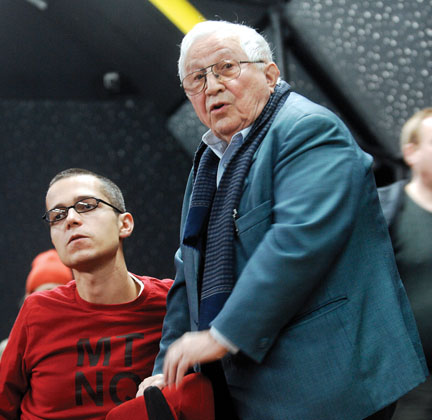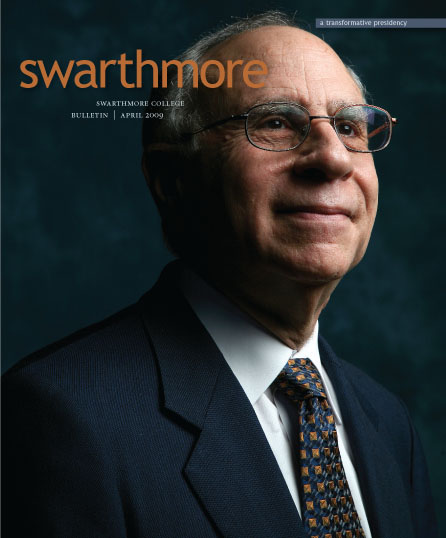Skyscrapers and Emptiness
Although he does not have any Jewish ancestry he is aware of, Zadara sees Jewish-Polish culture—which once stood on the brink of annihilation—as part of his heritage.

Zadara (right) in action as director of The Index by Tadeusz Rozewicz at the Wspolczesny Teatr in Wroclaw.
“Skyscrapers and emptiness,” says Polish theater director Michal Zadara ’99, as he sits across the table from me, smoking a slim cigarette and gesturing pointedly at the Warsaw skyline outside the cafe window. I think I understand what he means. There is a disconcerting sense of unoccupied space at the heart of the city, amidst all the bombastic Stalinist architecture and modern glass hotels strewn awkwardly around the train station.
But when Zadara starts to speak about Bat Yam-Tykocin, his most recent play, it appears that he means the words in another sense as well.
“A huge void was left after the extermination of the immense Jewish community that was here before the Second World War,” he says. “And Poland had the largest Jewish community in Europe before the creation of Israel—three million people, that was 10 percent of the population. A half-million lived in Warsaw alone.”
The struggle of Poles grappling with the absence of their country’s once deeply rooted Jewish civilization is the subject of Bat Yam-Tykocin, which is actually a pair of plays—one by Polish playwright Pawel Demirski and the other by Israeli playwright and director Yael Ronen—that were commissioned by the National Theater of Israel as part of the 2008 Year of Polish Culture in Israel. Although conceived and rehearsed separately, the plays offer complementary takes on the complex, ambivalent relationship between Poland and Israel in the last half century.
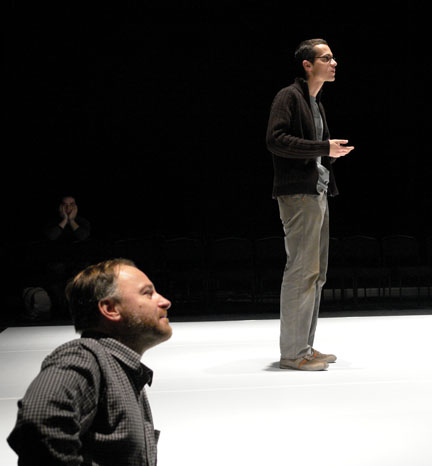
On one of his recent productions, The Dismissal of the Greek Envoys (above), by Jan Kochanowski, Zadara was assisted by Joseph Borkowski ’08, a participant in Swarthmore’s Department of Theater’s Semester in Poland Program.
Ronen’s play follows an Israeli family from Bat Yam visiting Eastern European concentration camps, Warsaw, and their father’s Polish hometown of Tykocin, whose Jewish population was decimated during the Shoa; Demirski’s work centers on a “nice old lady” in the same Polish town who is about to receive a Righteous Among the Nations award—Israel’s honor for Gentiles across Europe who saved Jews during the Shoa without asking for recompense. Yet as the ceremony is being arranged, a crew of ambitious journalists from Warsaw, who, in Zadara’s words, are “somewhat obsessed with Polish-Jewish history,” discover that the woman could not possibly have done what she claimed, and they travel to the town to expose her as a fraud.
This scenario of deception and pettiness does not credit any of its characters with a great deal of nobility; through a darker subtext of pathology and greed, it captures some of the fixation among certain Poles with Jewish culture and its loss. And this is a phenomenon that can come as a shock to Israelis, who have not thought of Poland as a Jewish land for a long time. And perhaps it’s why Bat Yam-Tykocin has such power in both Israel and Poland.
“Poland used to be a taboo topic for Jews in Israel,” Zadara says. “The [Zionists] who left Europe before the war were building a new kind of Jew—a muscle Jew, as they called it. And after the war, Shoa survivors were—in a way—terribly ashamed of what the Shoa had done to them, so they distanced themselves from the Diaspora. Later, Shoa discourse was codified within certain boundaries, and sympathy for the old country certainly does not fall within those boundaries. In my opinion, the Shoa has taken the place of prewar Zionism as the foundational myth of Israel, and Poland exists within that myth purely as the site of Jewish extermination.”
Zadara had just started work on Demirski’s script when I spoke with him last summer, but he was already thinking broadly about the issues at stake in the production. For him, it’s a chance to communicate to Israeli audiences the impulse that inspired scholars in Lublin to construct a scale model of the city in its former Jewish incarnation, that urge that leads non-Jewish musicians in Krakow to maintain an energetic Klezmer scene there. Clarinets howl though the lofts of Kazimierz, the ancient Jewish quarter that remains intact despite the fact that most its residents were deported and killed.
In Zadara’s eyes, the Poles’ desire to preserve, to fill the void, is an urgent necessity. The surviving Jewish community, further depleted by emigration and old age, is simply no match for the sheer volume of remains it has inherited, the quantity of history to be catalogued, preserved, and restored. And naturally, not all Polish Jews—especially the younger generation—want or are able to spend their lives tending this massive landscape of cultural ruins.
“The only thing we can do,” Zadara says, “is to say, okay, these are our ruins. They aren’t somebody else’s ruins. They shouldn’t just be shipped off to Israel.”
Although he does not have any Jewish ancestry (as far as he is aware of), Zadara sees Jewish-Polish culture—which once stood on the brink of annihilation—as part of his heritage. Preserving its intellectual traditions is among the tasks he sets himself as a theater director, and he has many peers in architecture, literature, and film who feel the same way.
There are “right-wing, nationalist elements” for whom Polish culture means Catholicism and ethnic homogeneity, he concedes. But Zadara takes a longer view. His sense of national identity harkens back to the time of the Austro-Hungarian Empire and the Polish-Lithuanian Union, when Poland was “the most tolerant and ethnically diverse state in Europe.”
Zadara’s thinking about his homeland developed critically while he was at Swarthmore, where he began his theater education under Professor Allen Kuharski. An ocean’s distance provided him with new perspectives. A moment early in his undergraduate career proved particularly influential. He and a newly minted group of friends were sitting in his off-campus apartment discussing literature, or China. Suddenly, it dawned on them that—although they came from different religious backgrounds and from cities as far apart as Sacramento and Jerusalem—they all shared Eastern-European descent.
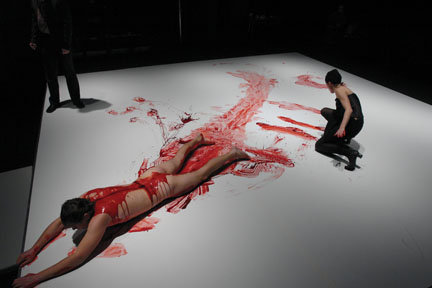
Since his graduation from the State Academy of Theater in Krakow, Zadara’s star has risen rapidly. With their visually compelling, anti-naturalistic atmosphere, his recent productions, including Ifigenia and The Dismissal of the Greek Envoys (above) have earned him comparisons to Krystian Lupa, Poland’s most renowned contemporary director.
This was an uncanny revelation for Zadara: “This thing you have is somehow larger than you, and it controls you. Even after the Holocaust, even after the emigration to America, there is something about Eastern Europe that stays with you no matter what history has done to you.”
Around the same time, former Professor of Religion Nathaniel Deutsch introduced him to the fiction of Bruno Schulz, an early 20th-century fabulist of Galician small-town life who has been compared to Marc Chagall and Franz Kafka. “Schulz was clearly a brilliant Polish writer; he wrote some of the most beautiful works written in the Polish language. But he’s also clearly a Jewish writer,” says Zadara. “When you look at Poland from however many miles away, you see Poland as a whole. You don’t see a difference between who was Jewish or who was not Jewish. That didn’t make any sense to me.”
Zadara’s interest in multi-ethnic Polish history—and Judaism in particular—would have a decisive effect on his directing career.
After completing a double major in theater and political science, Zadara did a brief stint at a New York software company while collaborating with an indie drama company before heading back to Europe, where he believed the state-subsidized and well-attended theater scene to be more fecund. He applied to a highly competitive directing program at the State Academy of Theater in Krakow and, to his shock, didn’t even get an invitation for an interview. He was sure that his application, an annotated play-script, demonstrated his complete technical proficiency in all aspects of directing. He couldn’t imagine what had happened.
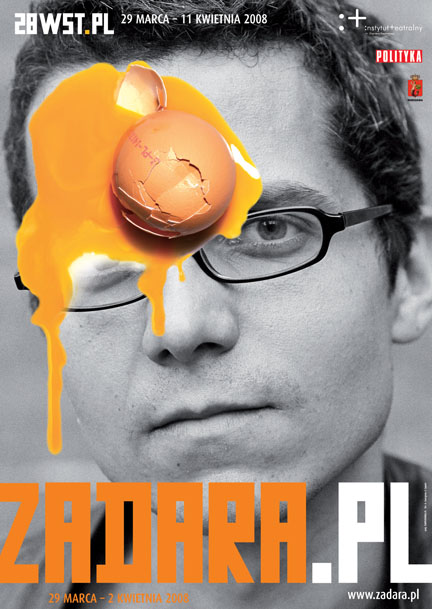
A poster created for the 2008 Warsaw Meetings Festival, for which Michal Zadara was the featured director.
Having pursued his education abroad, Zadara had failed to anticipate the divide between theatrical cultures in the United States and his home country. The technocratic American theater, he says, views ensembles as well-oiled machines run by skilled specialists; whereas in Poland, technique is a secondary issue, while performance is most important. In a Polish production, the members of the company sit around for weeks in rehearsal and talk about how the material resonates with them, he says with a touch of irony. The dean of the Academy had told Zadara that his fellow deans wouldn’t even consider him for the program, because he hadn’t given them any insight into his emotional being.
Zadara spent the next year living in Warsaw, assisting the director Krzysztof Warlikowski. During that time, he read a great deal about the events in the city during World War II, in particular the uprising in the Jewish ghetto. Right there in the city center, where Zadara and I are sitting, the Germans had liquidated the underground bunkers with Jewish resistance fighters inside them. The incomplete crop of postwar buildings we were looking at had been built right on top of the corpses.
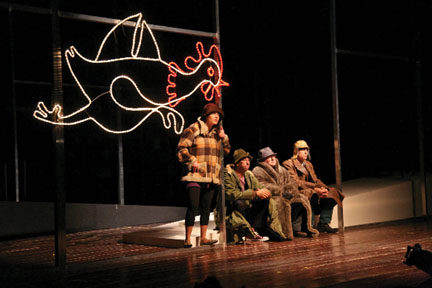
In fall 2008, the world premiere of Bat Yam-Tykocin (above) took place, co-produced by the Polish Wroclawski Teatr Wspolczesny and the Habimah National Theatre of Israel. Michal Zadara directed Polish playwright Pavel Demirski’s Tykocin; Bat-Yam was written and directed by Israeli playwright/director Yael Ronen. The plays, which may stand alone or be shown together, were commissioned by the National Theatre of Israel as part of the 2008 Year of Polish Culture in Israel. During production of Bat Yam-Tykocin, Louis Jargow ’10, an honors theater major, worked as Zadara’s sound designer and assistant director. Jargow is currently writing a thesis on Zadara
Zadara says that this fact developed into an “unhealthy obsession” for him: “I stopped being able to communicate with normal people. People would say, ‘What’s up?’ and I would say, ‘Actually, I just read today that on this corner there was this massacre and on this corner, this burned and that burned.’”
The next year he applied again to the Academy. This time, he chose The Visit by Friedrich Dürrenmatt for a script—a play about past crimes that come back to haunt a well-to-do young man. In his notes, Zadara connected the material to his own ghostly reckonings and to recent revelations of Polish pogroms in the 1940s. This time, he got into the program, one of four admitted from among 600 applicants.
Since his graduation from the State Academy, Zadara’s star has risen rapidly. With their visually compelling, anti-naturalistic atmosphere, his recent productions, including Ifigenia and The Dismissal of the Greek Envoys, have earned him comparisons to Krystian Lupa, Poland’s most renowned contemporary director. Although he resists this connection, he says that he and Lupa share a “rejection of all style and technique” and an embrace of theater based “completely on issues.”
His dramatic credo is neo-Brechtian; he believes in taking the process of alienation to the extreme. “At every moment, [the audience] should have to ask themselves, ‘What am I watching?’ and never have the possibility of emotionally immersing themselves in the experience. The self-awareness generated by this continual estrangement—Brecht’s Verfremdungseffekt—allows the viewer to produce his or her own thoughts and reactions to the issues, rather than being fed ideas and images from the stage.
Asked about how he reconciles his anti-stylistic philosophy with the perceived aestheticism of his work, Zadara refers to a lecture by philosopher Karl Popper, who said that the making of a new scientific discovery always has the quality of a strange beauty.
For Zadara, good theater is always a new discovery.
Eli Epstein-Deutsch is pursuing a self-designed major in modernistic studies and is a cofounder of the student magazine The Night Cafe.
 Email This Page
Email This Page